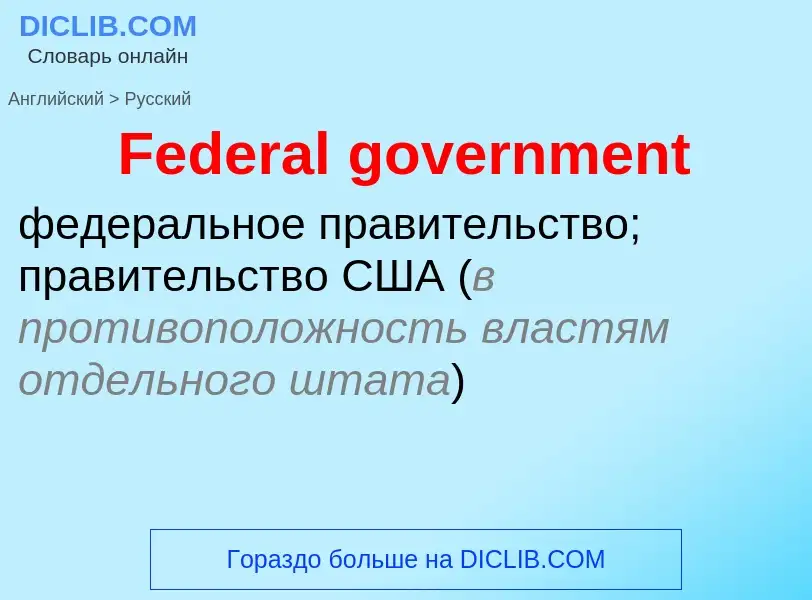Traduction et analyse de mots par intelligence artificielle ChatGPT
Sur cette page, vous pouvez obtenir une analyse détaillée d'un mot ou d'une phrase, réalisée à l'aide de la meilleure technologie d'intelligence artificielle à ce jour:
- comment le mot est utilisé
- fréquence d'utilisation
- il est utilisé plus souvent dans le discours oral ou écrit
- options de traduction de mots
- exemples d'utilisation (plusieurs phrases avec traduction)
- étymologie
Federal government - traduction vers russe
федеральное правительство
Wikipédia
A federation (also known as a federal state) is a political entity characterized by a union of partially self-governing provinces, states, or other regions under a central federal government (federalism). In a federation, the self-governing status of the component states, as well as the division of power between them and the central government, is constitutionally entrenched and may not be altered by a unilateral decision, neither by the component states nor the federal political body. Alternatively, a federation is a form of government in which sovereign power is formally divided between a central authority and a number of constituent regions so that each region retains some degree of control over its internal affairs.
It is often argued that federal states where the central government has overriding powers are not truly federal states. For example, such overriding powers may include: the constitutional authority to suspend a constituent state's government by invoking gross mismanagement or civil unrest, or to adopt national legislation that overrides or infringes on the constituent states' powers by invoking the central government's constitutional authority to ensure "peace and good government" or to implement obligations contracted under an international treaty.
The governmental or constitutional structure found in a federation is considered to be federalist, or to be an example of federalism. It can be considered the opposite of another system, the unitary state. France, for example, has been unitary for many centuries. The Austrian Empire was a unitary state with crown lands, after the transformation into the Austria-Hungary monarchy the remaining crown lands of so-called Cisleithania became federated as Länder of the Republic of Austria through the implementation of its constitution. Germany, with its 16 states, or Länder, is an example of a federation. Federations are often multi-ethnic and cover a large area of territory (such as Russia, the United States, Canada, India, or Brazil), but neither is necessarily the case (such as Saint Kitts and Nevis or the Federated States of Micronesia).
Several ancient chiefdoms and kingdoms, such as the 4th-century BCE League of Corinth, Noricum in Central Europe, and the Iroquois Confederacy in pre-Columbian North America, could be described as federations or confederations. The Old Swiss Confederacy was an early example of formal non-unitary statehood.
Several colonies and dominions in the New World consisted of autonomous provinces, transformed into federal states upon independence such as the United States, and various countries in Latin America (see Spanish American wars of independence). Some of the New World federations failed; the Federal Republic of Central America broke up into independent states less than 20 years after its founding. Others, such as Argentina, have shifted between federal, confederal, and unitary systems, before settling into federalism. Brazil became a federation only after the fall of the monarchy, and Venezuela became a federation after the Federal War. Australia and Canada are also federations.
Germany is another nation-state that has switched between confederal, federal and unitary rules, since the German Confederation was founded in 1815. The North German Confederation, the succeeding German Empire and the Weimar Republic were federations.
Founded in 1922, the Soviet Union was formally a federation of Soviet republics, autonomous republics and other federal subjects, though in practice highly centralized under the government of the Soviet Union. The Russian Federation has inherited a similar system.
India, Pakistan, Nigeria and Malaysia (then Federation of Malaya) became federations on or shortly before becoming independent from the British Empire.
In some recent cases, federations have been instituted as a measure to handle ethnic conflict within a state, such as Bosnia and Herzegovina, and Iraq since 2005.
With the United States Constitution having become effective on 4 March 1789, the United States is the oldest surviving federation, while the newest federation is Nepal, after its constitution went into effect on 20 September 2015.

![26 cantons]]. 26 cantons]].](https://commons.wikimedia.org/wiki/Special:FilePath/Carte suisse2.png?width=200)
![The [[United Provinces of Central America]] was a short-lived federal republic. The [[United Provinces of Central America]] was a short-lived federal republic.](https://commons.wikimedia.org/wiki/Special:FilePath/CentralAmerica1860MapSmall.jpg?width=200)
![National Capital Territory]]. National Capital Territory]].](https://commons.wikimedia.org/wiki/Special:FilePath/Map-of-india-political-enlarge-view.gif?width=200)
![36 states and the Federal Capital Territory]]. 36 states and the Federal Capital Territory]].](https://commons.wikimedia.org/wiki/Special:FilePath/Nigeria states.png?width=200)

